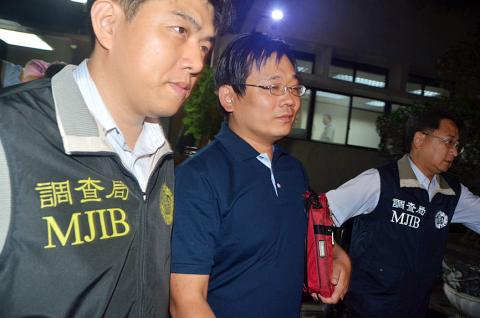Win Semiconductors Corp (穩懋半導體) yesterday said investigators suspect some of its former and current engineers of involvement in the theft of corporate secrets, some of which were sent on to Chinese rival Chengdu Gastone Technology Co (成都嘉石).
The investigation is the latest in a slew of trade-secret thefts linked to the nation’s technology companies, after employees of handset chipmaker MediaTek Inc (聯發科) pleaded guilty of stealing personnel information to be used in talent poaching last month.
Win Semi called on rivals to stop stealing trade secrets, poaching talent or employing any other unfair competition practices, the company said in a filing with the Taiwan Stock Exchange.

Photo: Cheng Shu-ting, Taipei Times
More than 50 investigators yesterday raided 12 locations, including the offices and homes of seven former and current employees of Win Semiconductors, and have seized important evidence, the Ministry of Justice Investigation Bureau said in a statement.
“Investigators found seven suspects, led by one surnamed Yang (楊), have passed information on key technologies developed by Win Semiconductors to its Chinese rival, Chengdu Gastone,” an investigator said on the telephone.
Chengdu Gastone approached former Win Semiconductors employees and its equipment suppliers via headhunting agencies to obtain trade secrets and key technology information, said the investigator, who declined to be named.
The Chinese semiconductor company offered bribes and jobs in exchange for valuable technology information, the bureau said in the statement.
Yang and other suspects were offered positions at Chengdu Gastone and they were set to leave Taiwan for China on Monday, the bureau added.
Win Semiconductors is the world’s largest foundry services provider of gallium arsenide components used in mobile phones. The Linkou (林口), Taoyuan-based firm has become a target of Chinese rivals as they aggressively expand their reach in the supply chain of the semiconductor industry, the statement said.
China plans to build new factories to produce gallium arsenide components in Beijing, Chengdu and Fuzhou, the bureau said, citing information it obtained.
Two months ago, Win Semiconductors told the Taoyuan District Court that it had found several employees had illegally duplicated and stored certain secret technology information. The company told the court at the time that it was highly concerned about possible leakage to rivals.
Win Semiconductors reported net income of NT$805 million (US$24.6 million) for last quarter, up 30 percent from a year earlier and 83 percent from the previous quarter, with earnings per share of NT$1.32. In the first three quarters, cumulative earnings per share reached NT$2.81, while revenue totaled NT$9.87 billion in the first 10 months of the year, up 20.11 percent from a year earlier.
The company yesterday said its operation would not be affected by the latest investigation.
Last month, management forecast revenue for this quarter to increase by high single digits from last quarter’s NT$2.913 billion with a stable gross margin, saying that inventory correction would gradually come to an end, and citing emerging signs of stabilizing demand from wireless, cellular and infrastructure segments.
Win Semiconductors shares plunged 3.43 percent to NT$46.5 yesterday, under-performing the TAIEX, which declined 1.77 percent.

In Italy’s storied gold-making hubs, jewelers are reworking their designs to trim gold content as they race to blunt the effect of record prices and appeal to shoppers watching their budgets. Gold prices hit a record high on Thursday, surging near US$5,600 an ounce, more than double a year ago as geopolitical concerns and jitters over trade pushed investors toward the safe-haven asset. The rally is putting undue pressure on small artisans as they face mounting demands from customers, including international brands, to produce cheaper items, from signature pieces to wedding rings, according to interviews with four independent jewelers in Italy’s main

Macronix International Co (旺宏), the world’s biggest NOR flash memory supplier, yesterday said it would spend NT$22 billion (US$699.1 million) on capacity expansion this year to increase its production of mid-to-low-density memory chips as the world’s major memorychip suppliers are phasing out the market. The company said its planned capital expenditures are about 11 times higher than the NT$1.8 billion it spent on new facilities and equipment last year. A majority of this year’s outlay would be allocated to step up capacity of multi-level cell (MLC) NAND flash memory chips, which are used in embedded multimedia cards (eMMC), a managed

Japanese Prime Minister Sanae Takaichi has talked up the benefits of a weaker yen in a campaign speech, adopting a tone at odds with her finance ministry, which has refused to rule out any options to counter excessive foreign exchange volatility. Takaichi later softened her stance, saying she did not have a preference for the yen’s direction. “People say the weak yen is bad right now, but for export industries, it’s a major opportunity,” Takaichi said on Saturday at a rally for Liberal Democratic Party candidate Daishiro Yamagiwa in Kanagawa Prefecture ahead of a snap election on Sunday. “Whether it’s selling food or

In the wake of strong global demand for AI applications, Taiwan’s export-oriented economy accelerated with the composite index of economic indicators flashing the first “red” light in December for one year, indicating the economy is in booming mode, the National Development Council (NDC) said yesterday. Moreover, the index of leading indicators, which gauges the potential state of the economy over the next six months, also moved higher in December amid growing optimism over the outlook, the NDC said. In December, the index of economic indicators rose one point from a month earlier to 38, at the lower end of the “red” light.